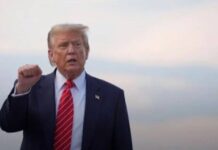
The Deep State has been out to get Trump from the start. There’s even been threats on his life.
That’s why the Secret Service was forced to secretly track a former FBI director.
In May, former FBI Director James Comey posted an image on Instagram showing seashells arranged to form the numbers “86 47” on a beach, captioned as a “cool shell formation.” The post sparked controversy, with some interpreting “86” as a restaurant term for removing something and “47” as a reference to the 47th president, suggesting a call for violence against President Trump. The Secret Service responded swiftly, tracking Comey’s cellphone location the next day, according to three anonymous government officials cited by The New York Times. Unmarked vehicles and plainclothes agents followed Comey and his wife, Patrice, as they traveled from a North Carolina vacation to their Washington, D.C.-area home.
Comey deleted the post after backlash, clarifying in a follow-up that he viewed the shells as a political message but was unaware of any violent connotations. He emphasized his opposition to violence and removed the post to avoid misinterpretation. Despite this, the Secret Service interviewed him by phone that evening, and upon his return home, agents escorted him to their D.C. headquarters for further questioning. The agency justified the surveillance as a response to “exigent” circumstances, with federal law enforcement also monitoring his home.
No charges have been filed against Comey, and the investigation’s status remains undisclosed. The Secret Service, through spokesman Anthony Guglielmi, stated it investigates all potential threats to protectees but declined to comment on specifics. A White House official, speaking anonymously, clarified that the inquiry was initiated independently by the Secret Service, not at the White House’s request. Comey’s representative offered no comment to The Times.
The incident drew sharp reactions. Homeland Security Secretary Kristi Noem condemned Comey’s post as a direct threat to Trump, pledging a thorough investigation. Trump, then on a Middle East trip, responded by asserting that Comey fully understood the post’s implications, equating it to a clear call for assassination.
Establishment’s Fear of Donald Trump
Donald Trump’s political ascent has consistently unsettled the traditional power structures in Washington, D.C., and beyond, as his outsider status and populist rhetoric challenge entrenched interests. From his 2016 campaign to his current tenure as the 47th president, Trump has positioned himself as a disruptor of the political elite, often referred to as “the establishment.” This group—comprising career politicians, bureaucrats, media figures, and institutional leaders—has long viewed Trump as a threat to their influence, prompting varied responses ranging from legal challenges to public criticism.
The establishment’s unease began during Trump’s first campaign, when his unorthodox style and direct communication via platforms like X bypassed traditional media gatekeepers. Political analysts noted that his ability to galvanize a disillusioned electorate threatened the status quo, as he criticized institutions like the FBI, DOJ, and mainstream media for perceived biases. A 2016 Washington Post article highlighted how Trump’s attacks on “rigged systems” resonated with voters, alarming elites who relied on those systems for authority.
The Comey incident exemplifies this tension. As a former FBI director, Comey represents the establishment’s upper echelon, and his alleged post, even if misinterpreted, fueled narratives of institutional hostility toward Trump. The swift Secret Service response shows the heightened sensitivity to threats against him, indicating fears of his polarizing influence. A 2020 Atlantic article argued that Trump’s ability to expose institutional vulnerabilities—such as perceived politicization within the FBI—has made him a unique challenge to bureaucratic power.
Legal battles further illustrate this dynamic. From the Russia investigation to two impeachments, Trump has faced relentless scrutiny from establishment figures, which his supporters argue is a coordinated effort to undermine him. A 2021 report from the Brookings Institution noted that these actions, while legally grounded, often appeared to Trump’s base as politically motivated, deepening distrust in institutions. This cycle of confrontation has only amplified the establishment’s wariness, as Trump’s resilience keeps him a formidable force.
Media coverage has also played a role. Outlets like CNN and The New York Times have frequently framed Trump as a danger to democratic norms, a narrative that critics argue masks establishment efforts to maintain control. A 2023 Pew Research study found that 60% of Americans believe the media unfairly targets political figures like Trump, reinforcing his narrative as a victim of elite overreach. This perception has emboldened his movement, further alarming those in power.
The establishment’s fear is not merely about policy disagreements but about Trump’s ability to disrupt long-standing norms. His use of executive actions, such as bypassing Congress on immigration policies, and his vocal criticism of “deep state” actors have rattled career officials. A 2018 Politico piece detailed how federal employees felt personally targeted by Trump’s rhetoric, which painted them as obstructing his agenda.
Trump’s return to power in 2025 has intensified these concerns. Recent X posts from political commentators suggest that establishment figures are bracing for aggressive policy moves, such as deregulation or DOJ reforms, that could further erode their influence. A January 2025 Reuters article reported on anxieties among federal agencies about potential purges of perceived disloyal staff, a fear rooted in Trump’s past promises to “drain the swamp.”
The Comey episode, while isolated, fits into this narrative. Whether intentional or not, the post tapped into a cultural undercurrent of hostility toward Trump, which the establishment both fears and, in some cases, fuels. The Secret Service’s response, while procedural, highlights the extraordinary measures taken to protect Trump, reflecting his status as a lightning rod for both adoration and animosity.
This dynamic shows no signs of abating. Trump’s ability to maintain a loyal base, as evidenced by his 2024 election victory, continues to challenge the establishment’s grip on power. A 2025 Gallup poll indicated that 45% of Americans view Trump as a transformative figure, a statistic that unnerves those invested in maintaining institutional stability. As long as Trump remains a political force, the establishment’s apprehension—and its efforts to counter him—will likely persist.



















